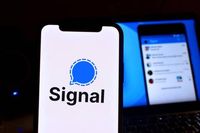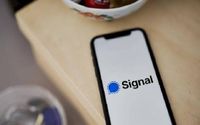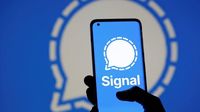In a world increasingly filled with concerns about privacy and electronic security, the "Signal" application stands out as one of the most secure messaging platforms, thanks to its end-to-end encryption system. However, this application, which is used by activists, journalists, and even government officials, finds itself increasingly at the heart of a major security debate.
On March 26, 2025, Jeffrey Goldberg, editor of The Atlantic magazine, revealed that he accidentally added a journalistic line to a community discussion that included members of the Trump administration, raising military concerns over discussions about sensitive military plans in Yemen. This incident has sparked serious questions about the extent of using the application in exchanging sensitive information.
Signal is available for all iPhone and Android devices and is one of the most popular applications among journalists and activists due to its advanced privacy features. It offers a level of privacy comparable to other messaging platforms, but it is not immune to sharing confidential information of a governmental or military nature. Matthew Miltsteadt, a researcher in technology policy at Cato, stated in a statement sent via email to CNN that "in the Signal application, messages are secure when transferred between devices, but their arrival to the recipient may be subject to danger."
Despite its reputation for security, the incident involving Goldberg raises concerns about the safety of using Signal for sensitive communications. While Signal provides strong privacy protections, it does not prevent human error, as demonstrated in this case. The application is not designed for sharing government or military information, and there are factors beyond its control, such as the identity of users participating in conversations and the security of the devices being used.
Signal is considered a secure messaging app because it relies on end-to-end encryption (E2EE), ensuring that messages remain private throughout their transmission. All Signal communications, including user stories and files, are fully encrypted, meaning that data remains protected during transfer and cannot be understood except by the sender and receiver. According to its privacy policy, Signal cannot access the contents of messages or even user names or images. Ifa Jalbrin, director of cybersecurity at the Electronic Frontier Foundation, noted that if Signal receives a subpoena, it will not be able to provide any data mentioning the users.
The application stores events on users' devices only, not on its servers, but it keeps messages temporarily in queues awaiting delivery when the device reconnects to the Internet. Signal also includes the "security number" feature, which helps users verify the identity of their interlocutors. Although some of these features, such as full encryption, have become common in other applications, Signal combines them in a unique way that enhances privacy.
Signal's user base is estimated to be around 40 to 50 million people globally, significantly smaller than that of WhatsApp, which boasts over 2 billion users. However, its popularity has surged, especially after many users began to abandon WhatsApp in 2021 due to privacy concerns. The application is available on the App Store and Google Play and requires a phone number to create an account, but it allows users to hide their number when communicating with others.
From a technical standpoint, Signal is considered one of the most secure messaging applications due to its reliance on full encryption, which ensures the privacy of data. However, experts caution that the security of any application is directly related to the security of the device itself. If a device is compromised, hackers could potentially access all messages, even if they are encrypted.
The recent controversy surrounding Signal highlights the ongoing debate regarding the reliability of commercial applications for discussing sensitive security matters. While Signal offers high levels of data protection, the potential for human error raises significant risks. As Muhammad Azzam, an advisor in technology management, pointed out, the incident with Trump’s aides illustrates new challenges in the digital communication landscape, where encrypted applications have become essential tools not just for individuals but also for decision-makers.
Moreover, this situation raises important questions about the implications of using unregulated applications for official discussions. Some experts argue that reliance on commercial applications presents potential risks, while others claim that government-controlled applications might be more susceptible to hacking. This ongoing debate underscores the complexities of balancing privacy and national security in an era where governments are increasingly seeking to impose more oversight on encrypted communication channels.
Since its establishment in 2012 by Moxie Marlinspike and Brian Acton, Signal has gained widespread popularity. Yet, it continues to face challenges in navigating the delicate balance between privacy and national security. As concerns about the security of digital communications grow, the future of Signal and similar applications remains uncertain. Will absolute privacy be achievable in a world where technology, politics, and security are intertwined? This question lingers as users weigh the benefits of privacy against the potential risks of misuse.



